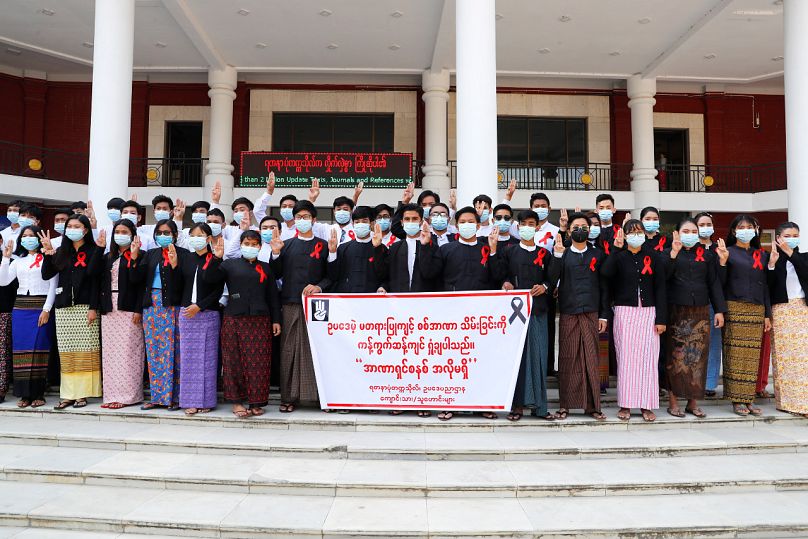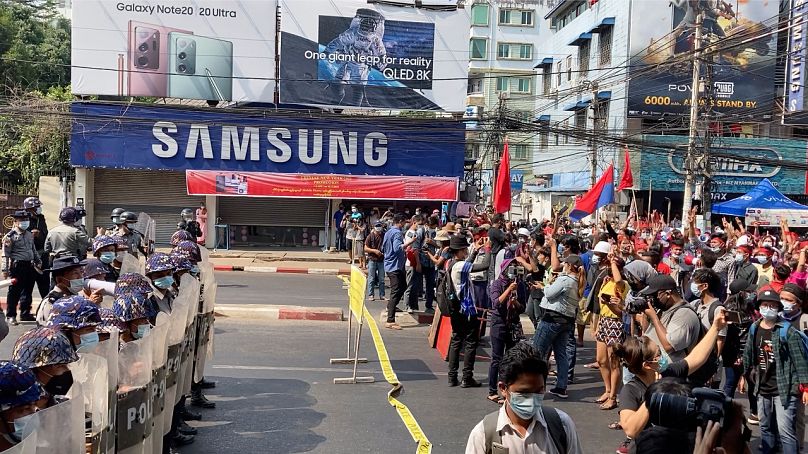Street protests in Myanmar continued to expand on Saturday as people gathered again to show their opposition to the army takeover.
Myanmar’s new military authorities appeared to have cut most access to the internet on Saturday as they faced a rising tide of protest over their coup that toppled Aung San Suu Kyi's elected civilian government.
It followed an earlier order to block social media platforms, which appeared not to have been completely effective. Meanwhile street demonstrations continued to expand as people gathered again to show their opposition to the army takeover.
Netblocks, a London-based service that tracks internet disruptions and shutdowns, said on Saturday afternoon that “a near-total internet shutdown is now in effect" in Myanmar, with connectivity falling to just 16% of normal levels.
Numerous internet users noted a slow disappearance of data services, especially from mobile service providers, that accelerated sharply late Saturday morning.
Broadband connection also later failed, while there were mixed reports on whether landline telephone service and mobile voice connections were still working.
The shutdown has echoes of Myanmar's darker past, after a nearly decade-long move toward greater openness and democracy. During the previous five decades of military rule, the country was internationally isolated and communication with the outside world strictly controlled.
Thousands rally in Yangon
Several thousand people demonstrated in the streets of Yangon, the country's biggest city, in the largest gathering since Monday's coup.
"Down with the military dictatorship," they chanted, many wearing red scarves and wristbands, the colours of the National League for Democracy (NLD) party of Aung San Suu Kyi, arrested on Monday.
Factory workers and students were prominent among the protesters who marched near a university in Myanmar's economic capital. By noon, more than 100 police in riot gear had been deployed to block them from moving ahead.
The protesters numbered around 3,000, AFP estimated. It was the boldest showing yet in the city by those opposed to the military takeover and appears to indicate a growing willingness to confront the new regime head-on.
Graduate lawyers from Myanmar's Yadanabon University on Saturday became the country's latest civil society group to show their opposition to the military coup against Suu Kyi's government.
Posing for a picture, more than two dozen lawyers donned red ribbons and showed the three-fingered protest salute. They held a banner reading: "We condemn the unlawful coup; No to dictatorship."
Social media shutdown
In addition to Facebook and related apps, the military government on Friday ordered communications operators and internet service providers to cut access to Twitter and Instagram. The statement said that some people are trying to use both platforms to spread fake news.
Social media users expressed concern over then unconfirmed reports that all internet access might be cut off, at least through the weekend. Some say they had lost service on their mobile networks.
Netblocks confirmed the loss of Twitter service starting 10 pm. Instagram was already subject to restrictions.
In a statement, Twitter said it is “deeply concerned” about the order to block internet services in Myanmar and vowed to “advocate to end destructive government-led shutdowns.”
“It undermines the public conversation and the rights of people to make their voices heard,” its spokesperson said.
State media are heavily censored and Facebook in particular has become the main source of news and information in the country. It is also used to organize protests.
For the fourth night Friday, the cacophony of noise from windows and balconies reverberated through Yangon neighborhoods, as resistance to the coup and arrests of activists and politicians gathered steam.
US calls on China to condemn coup
China’s top diplomat Yang Jiechi and U.S. Secretary of State Antony Blinken spoke Saturday in the first major exchange between the countries since President Joe Biden took office and touched on several critical issues that have strained their ties.
Blinken specifically called on China to condemn the military coup in Myanmar. Yang, in response, emphasized that the international community should create a good external environment for the proper settlement of the Myanmar issue.
China has invested billions of dollars in Myanmar mines, oil and gas pipelines and other infrastructure and is its biggest trading partner.
Earlier in the week the United Nations Security Council unanimously approved a call for a return to democracy in Myanmar and called for the immediate release of Aung San Suu Kyi and all those arbitrarily detained.
UN contact with military
Earlier Friday, nearly 300 elected lawmakers from Aung San Suu Kyi’s National League for Democracy party declared themselves as the sole legitimate representatives of the people and asked for international recognition as the country’s government.
They were supposed to take their seats Monday in a new session of Parliament following November elections when the military announced it was taking power for a year.
The military accused Suu Kyi and her party of failing to act on its complaints that the election was fraudulent, though the election commission said it had no found no evidence to support the claims.
In New York, Secretary-General Antonio Guterres pledged Friday that the United Nations will do everything it can to unite the international community and create conditions for the military coup in Myanmar to be reversed.
He told a news conference it is “absolutely essential” to carry out the Security Council’s calls for a return to democracy, respect for the results of the November elections, and release of all people detained by the military, “which means the reversal of the coup that took place.”
Guterres said Christine Schraner Burgener, the U.N. special envoy for Myanmar, had a first contact with the military since the coup and expressed the U.N.’s strong opposition to the takeover.
According to U.N. spokesman Stephane Dujarric, she reiterated to Deputy Commander-in-Chief Vice Gen. Soe Win “the secretary-general’s strong condemnation of the military’s action that disrupted the democratic reforms that were taking place in the country.”
Suu Kyi advisers detained
In addition to 134 officials and lawmakers who were detained in the coup, some 18 independent activists were also held, said the Assistance Association for Political Prisoners in Myanmar, who added that some have been released.
In what looks like the first arrest of a foreigner in Myanmar since Monday's coup, an Australian economic adviser to Aung San Suu Kyi said he had been detained. Sean Turnell, an economist from Macquarie University, said he feared being "accused of something" but was "not guilty of anything".
On Friday, Suu Kyi’s senior aide, Win Htein, was picked up in Mayangone township. He told BBC in a phone call earlier that he was being arrested for sedition, which carries a maximum penalty of life imprisonment.
Suu Kyi and President Win Myint are also under house arrest and have been charged with minor offences, seen by many as merely providing a legal veneer for their detention. She was described by her party as being in good health.
Also Friday, hundreds of students and teachers took to the streets to demand the military hand power back to elected politicians. Demonstrations spread to several parts of the country, even in the tightly controlled capital of Naypyitaw.
“We will never be together with them,” lecturer Nwe Thazin said of the military at a protest at the Yangon University of Education. “We want that kind of government to collapse as soon as possible.”
Myanmar was under military rule for five decades after a 1962 coup, and Suu Kyi’s five years as leader since 2015 had been its most democratic period despite continued use of repressive colonial-era laws and persecution of minority Rohingya Muslims.













